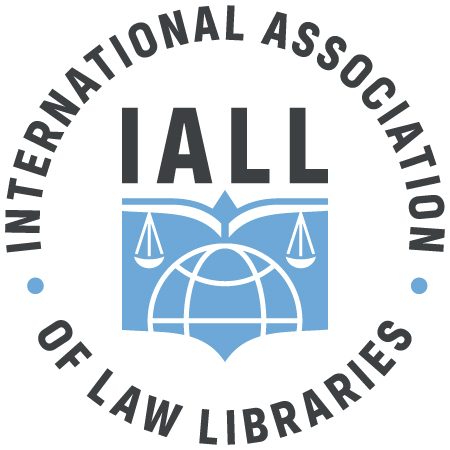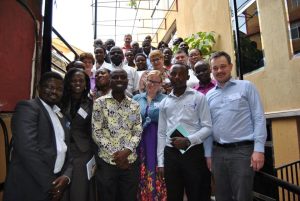 This past December, I had the privilege of traveling to Kampala, Uganda and assisting with a workshop on Open Access to legal knowledge in Africa. It was for law librarians in Anglophone Africa. The workshop was organized through the International Federation of Library Associations (IFLA), in cooperation with the International Association of Law Libraries (IALL). It was sponsored by IFLA, IALL, and HeinOnline.
This past December, I had the privilege of traveling to Kampala, Uganda and assisting with a workshop on Open Access to legal knowledge in Africa. It was for law librarians in Anglophone Africa. The workshop was organized through the International Federation of Library Associations (IFLA), in cooperation with the International Association of Law Libraries (IALL). It was sponsored by IFLA, IALL, and HeinOnline.
I was one of several organizers – with me were Mark Engsberg (Emory University), Joe Hinger (St. John’s University), Caroline Ilako (Markerere University), Sonia Poulin (Alberta Law Libraries), and Bård Tuseth (University of Oslo). Over the course of several months, we worked to bring together a group of African law librarians that came from the following countries: Uganda, Ghana, Kenya, Cote d’Ivoire, Nigeria, Zimbabwe, Tanzania, and South Africa.
Goals for the workshop were to empower participants to utilize open access legal sources in legal research. The workshop served as a first step in building a network of law librarians across Africa in order to share knowledge and assist each other in solving practical legal research questions. Participation provided an overview of open access legal sources worldwide, the practical skills required to benefit from them, and an opportunity to establish contact with colleagues from different countries.
One essential component of the workshop was for every participant to give a presentation. Most were 5 minutes long and organizers spoke from 15 minutes to 45 minutes on various topics with Q&A sessions afterward. Our reasons behind having every participant give a presentation were several; first, it encouraged each participant to plan for the workshop and guaranteed active participation. Second, each participant shared information on the legal research environment in their jurisdiction, which allowed for other participants to learn more about jurisdictions outside their own. It also assisted with networking, as each presentation allowed participants to better acquaint themselves with one another. Getting up in front of their peers gave each participant a chance to exercise skills in public speaking that they may not have otherwise used over the course of the two-day workshop.
The workshop also contained three breakout sessions where participants were gathered into small groups to foster discussion. Organizers joined in at each group table to act as facilitators for the small group discussions. After 45 minutes to an hour of discussion, the entire workshop group would come together and people from each group would relay their group’s findings. Discussion would ensue.
As organizers, we wanted to ensure that participants would continue to contribute to a network for African Law Librarians. To that end, we established several online forums after the workshop for participants and organizers to engage in virtual and practical collaboration with international colleagues. The forums included an email group hosted through Google Groups, a website hosted through Google Sites (where slide and paper presentations from the workshop have been uploaded), and a WhatsApp group for commentary and discussion amongst participants on topics tangentially related to librarianship.
So far the email chain and WhatsApp groups have been very vibrant. Participants continue to reach out to one another to discuss resources and let one another know what is happening in their jurisdictions. The website has been good for exchanging slides from the workshop and members have discussed what they would like to further do with the website.
We are excited to see this group continue in its efforts to further the goals of the workshop and look forward to further collaboration with members of the workshop. The experience was unforgettable and one I personally was honored and humbled to take part in. It was also very enjoyable to visit Uganda and learn more about the vibrant culture there. I look forward to visiting again.
Heather Casey
Georgetown University

